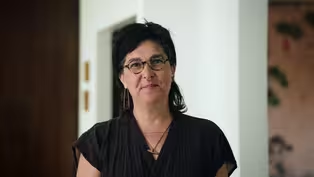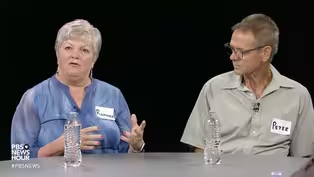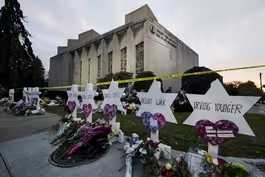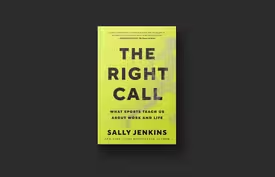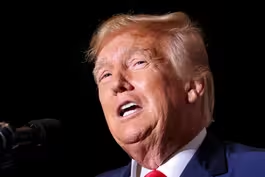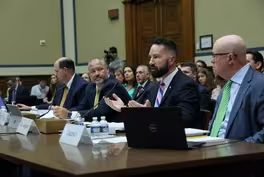
Germany's role as economic powerhouse at tipping point
Clip: 7/19/2023 | 8m 26sVideo has Closed Captions
Germany's role as economic powerhouse at tipping point amid recession
Germany's economy was the envy of Europe for many of the 30-plus years since reunification. But now the country is officially in recession and its people, used to decades of prosperity, are now losing confidence. Much of its current troubles have been caused by the war in Ukraine as Germany has turned its back on Russia, its former trading partner. Special correspondent Malcolm Brabant reports.
Problems playing video? | Closed Captioning Feedback
Problems playing video? | Closed Captioning Feedback
Major corporate funding for the PBS News Hour is provided by BDO, BNSF, Consumer Cellular, American Cruise Lines, and Raymond James. Funding for the PBS NewsHour Weekend is provided by...

Germany's role as economic powerhouse at tipping point
Clip: 7/19/2023 | 8m 26sVideo has Closed Captions
Germany's economy was the envy of Europe for many of the 30-plus years since reunification. But now the country is officially in recession and its people, used to decades of prosperity, are now losing confidence. Much of its current troubles have been caused by the war in Ukraine as Germany has turned its back on Russia, its former trading partner. Special correspondent Malcolm Brabant reports.
Problems playing video? | Closed Captioning Feedback
How to Watch PBS News Hour
PBS News Hour is available to stream on pbs.org and the free PBS App, available on iPhone, Apple TV, Android TV, Android smartphones, Amazon Fire TV, Amazon Fire Tablet, Roku, Samsung Smart TV, and Vizio.
Providing Support for PBS.org
Learn Moreabout PBS online sponsorshipGEOFF BENNETT: Germany's economy has been the envy of Europe for decades, but no longer.
The country is now officially in recession, and its people, who've been used to prosperity, are now losing confidence.
Much of Germany's current troubles have been caused by the war in Ukraine, with Germany turning its back on Russia, its former trading partner.
Special correspondent Malcolm Brabant reports from Berlin.
MALCOLM BRABANT: This is the face of Germany's new poor.
Ines, a former nurse and therapist, blames soaring energy costs for making her a client at one of the country's fastest growing sectors, food banks.
Out of embarrassment, she doesn't wish to give her surname.
INES, Food Bank Client (through translator): I never, ever thought it would come to this.
I worked in this country and raised three children.
I bought my own house, and I could never have foreseen myself in this situation.
MALCOLM BRABANT: Next in line is Alina, a hairdresser from Luhansk, one of the provinces in Eastern Ukraine occupied by Russian forces.
More than one million Ukrainian refugees have taken shelter in Germany since the war began.
ALINA, Ukrainian Refugee: It allows me to eat healthy food, because vegetables and fruits are very expensive here.
I can cook something.
I can eat.
I can buy meat, for example, because I'm going here.
MALCOLM BRABANT: In this country of 88 million, more than two million Germans are dependent on food banks.
This one is run by former Dr. Christina Klar in a church community center in what was West Berlin.
CHRISTINA KLAR, Food Bank Manager (through translator): At the beginning of this year, we had 100 to 120 households.
A household can be one person or a family with two adults and four or five children.
And the Ukraine war has virtually doubled that.
We are now at 200 households.
INES (through translator): As you can imagine, I'm ashamed to be here.
This is society's bottom layer.
But now there are so many middle-class people here.
Yes, and that includes me.
MALCOLM BRABANT: Food banks like this one are a real indication of poverty in one of the richest countries in the world.
And there are 14 million people who are considered to be in poverty.
That's one in six of the population.
MARCEL FRATZSCHER, President, German Institute For Economic Research: Germany and German citizens are in a state of shock.
The expectation was, even after the pandemic, we will return to the good old past of the 2010s, maximum employment, strongly growing wages, highly -- high competitiveness with other economies worldwide.
And now people realize the world will never be that way again.
MALCOLM BRABANT: Marcel Fratzscher is one of Germany's most respected economists.
He says that, after decades of growth and strength, the nation's economy is now at a tipping point.
MARCEL FRATZSCHER: People are worried about their jobs.
People are worried about what they have achieved in the past.
And the first sign of that is high inflation currently.
Most people, in particular, people with low incomes, are experiencing a massive cut in the purchasing power of their income and the living standard.
So people are scared.
BRIGITTE WEINBECK, Pensioner (through translator): I shop more consciously.
For example, I always make a plan at the beginning of the week about what I'm going to cook and when, and then I go shopping.
Otherwise, one sometimes has impulse purchases in between.
I avoid those now.
MALCOLM BRABANT: Berliners are constantly reminded of the source of their troubles by the monument commemorating the Russian-dominated Red Army that helped defeat the Nazis in World War II.
Outside Russia's embassy, Ukrainian folk music plays as a permanent protest against an invasion which has fueled inflation, created an energy crisis and stripped Germany of its defensive capacity.
Politicians insist that Germany is resolute in its support for Ukraine, but some beg to differ.
ERIC HANSEN, "The George Washington of Achievement": In my conversations with them, they're saying that things are getting more expensive.
That's what is the main thing.
And I think they would gladly give the Ukraine to the Russian, most Germans.
And they certainly do not want to give more money than they're already giving.
MALCOLM BRABANT: American author and social commentator Eric Hansen has lived in Berlin for decades and has written more than a dozen books in German.
ERIC HANSEN: They want a certain amount of prosperity.
And if you threaten to take it away, that's when they turn into different people.
You could see that in 2015, when the migrants came in, and they were really afraid of losing prosperity.
And that's when all the morals went out the window.
MALCOLM BRABANT: The Brandenburg Gate was once the Iron Curtain's western frontier.
Today, it's symbolic of Germany's current divisions.
Many in the former communist East believe Moscow's propaganda.
THOMAS WIEGOLD, Defense Analyst: Germans are rather afraid, because remembering the Second World War Is still very present in the collective memory.
NARRATOR: More of that captured German film, propaganda pictures, with which the Germans hoped to prove themselves unbeatable.
THOMAS WIEGOLD: Everybody had a grandfather who was in this war.
NARRATOR: We know how his war machines stabbed into the territory of our ally, but we all know too what it has cost him.
And he's far from achieving his object,the destruction of the Red Army.
THOMAS WIEGOLD: It's something Germans are aware of and really are afraid that this could happen again.
NARRATOR: Of course, the Soviet has lost tanks, hundreds of them.
So has Hitler in thousands.
MALCOLM BRABANT: Thomas Wiegold is one of Germany's leading defense analysts.
He says the nation's military is alarmed at how support for Ukraine has eroded its own capabilities.
THOMAS WIEGOLD: It's an open secret that ammunition stocks are running pretty low.
Officially and unofficially, the German armed forces are not in a position to fight a real war at the moment.
MALCOLM BRABANT: How long could Germany defend itself for, do you think, if there was a hot war?
THOMAS WIEGOLD: If there was a hot war, Germany would have a real problem when it comes to ammunition, certain types of ammunition.
The stocks are down to a few days' worth.
So this would mean Germany would have to rely on allies.
MALCOLM BRABANT: Besides defense, energy is Germany's most pressing concern.
Despite the war, the country's nuclear power stations have been shut down.
ALBERT STEGEMANN, Christian Democrats (through translator): In the long term, nuclear power is certainly not the technology of the future, but, at this time, it would have been good to be able to rely on it.
MALCOLM BRABANT: Deprived of Russian gas supplies, Germany is now importing higher-priced liquid natural gas to protect its economy and keep its citizens warm.
Germany's green energy sources aren't sufficient to fill the gap.
Klaus Mueller is the country's energy overseer.
KLAUS MUELLER, President, German Federal Network Agency: So what we need to do is, we need to be creative and innovative.
We need to save energy, and we need to invest in renewables.
MARCEL FRATZSCHER: Many companies might not survive the next five years, either because energy costs are too high.
WOMAN: We're planning a heat pump.
MALCOLM BRABANT: Despite boasts about its carbon footprint, the chemical giant BASF plans to relocate part of its production to China, blaming high energy costs at home.
WOMAN: And to power our own factories, we're building an offshore wind farm, the biggest in the world.
MALCOLM BRABANT: German prosperity has traditionally been rooted in the power of its motor manufacturing, but Fratzscher says that's no longer the case.
MARCEL FRATZSCHER: Car companies and other companies are losing out in global competition.
MALCOLM BRABANT: But is he downhearted?
No, he's not.
MARCEL FRATZSCHER: Germany's economic future might look very difficult, but Germany has a lot of strengths that are underestimated, often not seen, and which have been essential for Germany to manage big transitions, big challenges over the last 70, 80 years.
MALCOLM BRABANT: While Germany is not as badly off as other nations around the world, it has definitely lost its economic and defensive oomph.
But at least it still got its oompah.
(MUSIC) MALCOLM BRABANT: For the "PBS NewsHour," I'm Malcolm Brabant in Berlin.
Brief But Spectacular take on using craft to fight injustice
Video has Closed Captions
Clip: 7/19/2023 | 2m 59s | A Brief But Spectacular take on using craft to push back on injustice (2m 59s)
Iowa Republicans on hopes for overcoming divisions
Video has Closed Captions
Clip: 7/19/2023 | 11m 17s | Iowa Republicans discuss role of politics in their lives, hopes for overcoming divisions (11m 17s)
Jurors weigh death penalty for Pittsburgh synagogue killer
Video has Closed Captions
Clip: 7/19/2023 | 6m 17s | Jurors weigh death penalty or life in prison for Pittsburgh synagogue killer (6m 17s)
New book 'The Right Call' reveals life lessons from sports
Video has Closed Captions
Clip: 7/19/2023 | 8m 2s | New book 'The Right Call' reveals life lessons from sports (8m 2s)
Trump to massively expand power if elected, report says
Video has Closed Captions
Clip: 7/19/2023 | 5m 53s | Trump plans to massively expand executive power if elected, report says (5m 53s)
Whistleblowers claim DOJ meddled in Hunter Biden case
Video has Closed Captions
Clip: 7/19/2023 | 5m 15s | IRS whistleblowers claim Justice Department meddled in Hunter Biden investigation (5m 15s)
Providing Support for PBS.org
Learn Moreabout PBS online sponsorship
- News and Public Affairs

FRONTLINE is investigative journalism that questions, explains and changes our world.

- News and Public Affairs

Amanpour and Company features conversations with leaders and decision makers.












Support for PBS provided by:
Major corporate funding for the PBS News Hour is provided by BDO, BNSF, Consumer Cellular, American Cruise Lines, and Raymond James. Funding for the PBS NewsHour Weekend is provided by...
